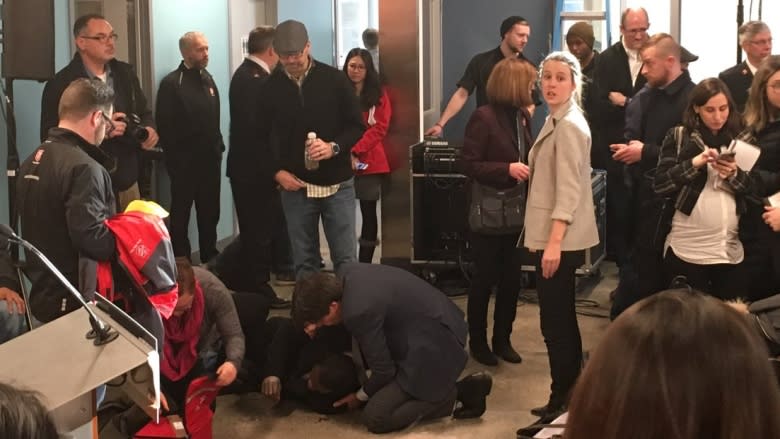Ontario health minister helps homeless man who fainted during announcement on health care in shelters
Ontario Health Minister Eric Hoskins rushed to the aid of a homeless man who collapsed at a news conference on Tuesday where Hoskins was announcing a new program aimed at bringing health care services to Toronto shelters.
The man, a Toronto shelter resident, appeared to have fainted. Hoskins, a physician, crouched down to help the man. Toronto paramedics were called and the man was taken to a local hospital.
Earlier, Hoskins said the program, to be run by provincial and municipal staff, is designed to improve the access of homeless people to health care services, including harm reduction, mental health and addictions supports, as well as wound care, foot care and chronic disease management.
Hoskins said the health care services will be provided at the shelters themselves.
"We are developing a new program that will bring health services to shelter users instead of the other way around," Hoskins told reporters at New Hope Leslieville shelter.
"We are going to make sure we get this right."
The program will take the form of pilot project at five shelters across the city: New Hope Leslieville, Runnymede, Birchmount, Kenny Roach and Warden.
According to an email from the Ontario health ministry, the program will provide more than 300 beds to vulnerable people who often have complex health needs.
Health care providers, shelter operators, city staff and the Toronto Central Local Health Integration Network will work together to develop a framework for "comprehensive, integrated and appropriate" health services for shelter clients, the ministry said.
The program will be implemented in the next few months, the ministry added. The network is made up of crown agencies that work with local health providers and community members to determine Toronto's health service priorities.
"The framework will be piloted in the five shelters and it will then be evaluated for its effectiveness prior to rolling out more broadly," the ministry said.
According to the ministry, the program will change the way shelter users get health care services because services will be provided in a more coordinated fashion, using centralized referral and intake processes.
"Funding considerations and details of how this pilot project will be evaluated will be determined as the pilot project is finalized in the months ahead," the ministry added.
Hoskins declined to provide details on the program's cost.
Staff at shelters will also work to identify the health services needed by the shelter users, then they will try to connect them to the agency or organization that can provide those services, according to Ontario Housing Minister Peter Milczyn.
Mayor calls program a 'breakthrough'
Mayor John Tory said at the news conference that the program is a "breakthrough" because it is an example of governments working together to improve the lives of Toronto homeless people.
"There are things that need to be done to augment the shelter system," Tory said. "I think today is a breakthrough. We are working together to find solutions to what is a very complex problem."
Tory said health professionals will be "embedded" in the homeless shelters.
The mayor said he regularly visits homeless people in shelters to better understand their needs.
Homeless people have told him about their health care issues, he said, and those issues often involve mental health problems and addictions. Tory went to a shelter in Scarborough on Sunday.
"It's not enough and we need to do a lot more."
Tory said many homeless people have suffered much trauma and supportive housing, not shelters, is the best place for them.
An influx of refugees to Toronto, many of whom have used the shelter system, has underscored the need for better access to health care services, he added.
An advisory committee of shelter operators, shelter users and health service providers has also been created to provide advice on improving access to health services for shelter users, the ministry said.




